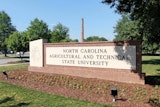 Karen Panetta, recipient of 2010 Presidential Award for Excellence in Science, mathematics and Engineering Mentoring
Karen Panetta, recipient of 2010 Presidential Award for Excellence in Science, mathematics and Engineering Mentoring
WASHINGTON — A breath of fresh air blew through our nation’s capital late Monday afternoon, when a group of professors gathered in the White House to be honored for their accomplishments as recruiters and mentors of students in the fields of science, technology, engineering and mathematics, or STEM.
During the ceremony, these men and women were presented with the 2010 and 2011 Presidential Awards for Excellence in Science, Mathematics and Engineering Mentoring. This award, presented by the White House every two years, recognizes individuals and organizations for their outstanding accomplishments in mentoring and acknowledges “the crucial role that mentoring plays in the academic and personal development of students studying science and engineering — particularly those who belong to groups that are underrepresented in these fields,” President Obama said in a statement.
“Our nation owes them a debt of gratitude for helping ensure that America remains the global leader in science and engineering for years to come,” the president added.
Recipients of the Presidential Mentoring award also receive grants of $25,000 from the National Science Foundation to advance their mentoring efforts.
The Ceremony and the Honorees
As the guests waited under the cold white lights of the auditorium, the mother of a Tufts University professor of electrical and computer engineering who would be honored that evening, leaned over toward this reporter and said how proud she, her husband and her son-in-law were of their daughter and wife, Dr. Karen Panetta. She related how her daughter had always been driven to excel in school while growing up in a hardscrabble neighborhood outside of Boston.
2010 Presidential Mentor Panetta was about to be cited for being dedicated to “overcoming negative stereotypes about women engineers,” for having “personally mentored 18 classes of … groups underrepresented in engineering” and for reaching out to more than 30,000 youth and educators through her Tufts University “Nerd Girls” program.
While the guests, simultaneously excited and sobered at the occasion, shut off their cell phones and readied their cameras and young White House aides glided across the hall attending to last-minute details, the honorees slowly filed into the auditorium. Family members, students and friends erupted into applause. The super mentors — who spend their lives applauding and encouraging others — happily grinned back before taking their assigned seats in the front of the hall.
A few minutes later, National Science Foundation Director Dr. Subra Suresh, opened the proceedings by noting that the presidential mentoring awards “recognize the important role of mentoring in bringing in a diverse pool of students” for training in the STEM fields.
Dr. John P. Holdren, the president’s assistant for science and technology, followed Suresh onto the podium. Alluding to the honorees’ meeting with President Obama earlier that day, Holdren assured them that “the president’s interest in math and science mentoring isn’t just genuine, it’s a passion.” He added, “You make the difference between students who flourish and those who never reach their potential for lack of a mentor.”
Delivering a message from the president, Holdren told the super mentors that they are “helping to ensure that America remains a global leader” in the sciences and technology.
2011 Presidential Mentor Dr. Juan E. Gilbert, of Clemson University, made a similar observation. “Throughout history,” he said, “countries with the most technology have led, and this is not always a good thing. It is important that we provide a strong STEM workforce, and to do that, you need mentoring.”
Gilbert was cited during the ceremony for, among other achievements, mentoring “more than one-third of the nation’s African-American Ph.D. graduates in computer science” from 2006 through 2009.
Other honorees include, for 2010:
Dr. Solomon Bililign, North Carolina Agricultural & Technical State University
Dr. Peggy Cebe, Tufts University
Dr. Roy Clarke, University of Michigan Ann Arbor
Dr. Amelito Enriquez, Cañada College
Dr. Karen Panetta, Tufts University
ACE Mentor Program of America (Conn.)
Ocean Discovery Institute (Calif.)
Women’s Health Science Program for High School Girls and Beyond, Northwestern University Feinberg School of Medicine
For 2011:
Dr. Winston Anderson, Howard University
Dr. Juan E. Gilbert, Clemson University
Dr. Shaik Jeelani, Tuskegee University
Dr. Andrew Tsin, University of Texas at San Antonio
Camp Reach, Worcester Polytechnic Institute (Mass.)
Diversity Programs in Engineering, Cornell University (N.Y.)
The Mathematical and Theoretical Biology Institute, Arizona State University
The Stanford Medical Youth Science Program, Stanford University (Calif.)
University of California San Francisco Science & Health Education Partnership High School Intern Program
Editor’s Note: In association with Cox, Matthews & Associates, the publisher of Diverse: Issues In Higher Education magazine and DiverseEducation.com, Dr. Juan E. Gilbert has been the developer of Applications Quest, a data mining software tool for academic admissions and human resource departments. Applications Quest, LLC, is a wholly owned subsidiary of Cox, Matthews & Associates.















